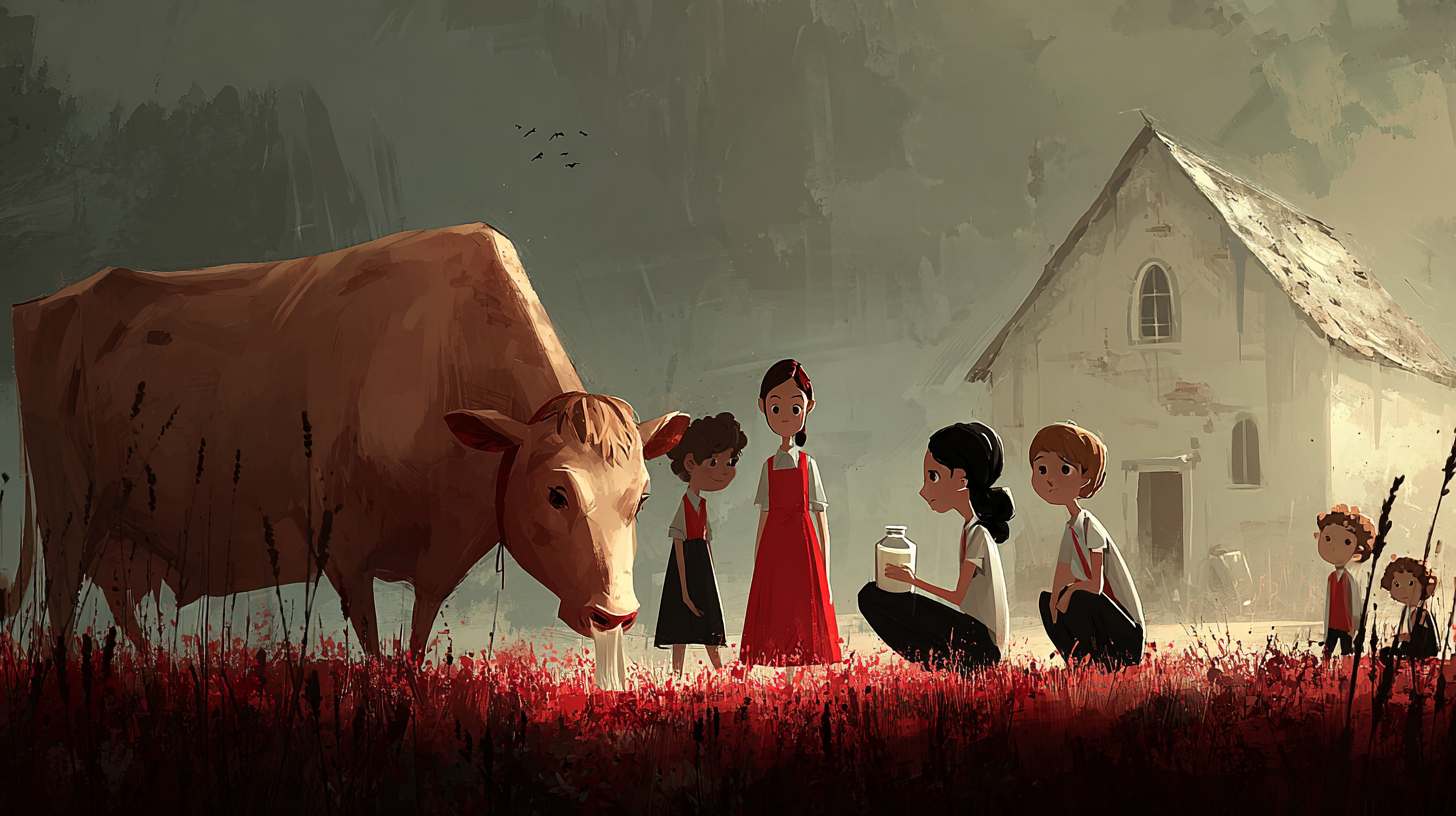“Cow” usually means a female farm animal that gives milk, but as a verb it can mean to frighten someone.
「cow」はふつう「乳をとるメスの牛」を意味するが、動詞では「人を怖がらせる」という意味もある。
以下は英単語 “cow” に関するストーリー型学習コンテンツです。まずは大枠の意味を理解して最後の文章で確認しましょう。
主な意味(main meaning)
| 品詞 | 意味 | 発音記号 | 例文 |
|---|---|---|---|
| 名詞 | 雌牛、乳牛 | /kaʊ/ | The cow is eating grass in the field. |
| 動詞 | (人を)脅す、怖がらせる | /kaʊ/ | He tried to cow his classmates with his loud voice. |
語源(etymology)
「cow」は古英語「cū」から来ており、もともと「雌の牛」を意味した。動詞用法は16世紀ごろに「威圧して従わせる」というイメージで生まれた。
類義語(synonyms)
| 類義語 | 意味 | 例文 |
|---|---|---|
| cattle | 牛(全般、特に家畜として) | The farmer owns many cattle. |
| ox | 雄牛(特に労働用) | The ox is pulling a heavy cart. |
| intimidate | 怖がらせる、脅す(動詞) | The big dog intimidated the children. |
| bully | いじめる、脅す(動詞) | He bullied his younger brother at school. |
反義語(antonyms)
| 反義語 | 意味 | 例文 |
|---|---|---|
| encourage | 励ます、勇気づける | The teacher encouraged the shy student to speak. |
| comfort | 安心させる、慰める | She comforted her friend after the bad news. |
コロケーション(collocations)
| コロケーション | 例文 |
|---|---|
| dairy cow | The dairy cow produces milk every day. |
| sacred cow | In some cultures, the cow is considered a sacred cow. |
| cow shed | The cows are resting in the cow shed. |
| to cow someone | The boss tried to cow the workers into silence. |
2項表現(binomials)
| 表現 | 例文 |
|---|---|
| cows and sheep | The farm has many cows and sheep. |
| fear and cow | The dictator ruled through fear and cow tactics. |
英語ストーリー(english story)
Mr. Brown was a farmer who lived in a small village. Every morning, he woke up early to take care of his cows. He had several dairy cows that gave milk, and he also kept some cattle for meat. In the cow shed, the animals were resting quietly, waiting for food.
One day, Mr. Brown’s neighbor, Tom, came to visit. Tom wanted to buy an ox to help him pull his cart. While they were talking, a group of children passed by the farm. One of the boys tried to bully another by shouting loudly. Mr. Brown saw this and said, “Don’t try to cow your friends. It is better to encourage and comfort them.”
Later, Tom and Mr. Brown discussed how in some countries, the cow is seen as a sacred cow, something people deeply respect. The children listened carefully, and one of them asked, “Why are cows and sheep so important to farmers?” Mr. Brown smiled and explained that cows give milk, meat, and leather, while sheep give wool.
At the end of the day, Tom decided to buy the ox, and the children promised not to intimidate each other again. They all left the farm feeling more respectful toward animals and people.
和訳
ブラウンさんは小さな村に住む農夫でした。毎朝、彼は早起きして**牛(cow)の世話をしました。彼は毎日ミルクをくれる乳牛(dairy cow)を何頭か飼い、さらに肉用の牛(cattle)**も育てていました。牛小屋(cow shed)では、牛たちが静かに休みながら食事を待っていました。
ある日、隣人のトムがやってきました。トムは荷車を引くための雄牛(ox)を買いたいと思っていました。話していると、近所の子どもたちが通りかかりました。そのうちの一人が大声で叫んで、友達をいじめる(bully)ようにしていました。ブラウンさんはそれを見て、「友達を脅す(cow)ようなことはするな。むしろ励まして(encourage)、**安心させる(comfort)**ほうがいい」と言いました。
その後、トムとブラウンさんは、一部の国では牛が**神聖な牛(sacred cow)**とされ、とても大切にされていることについて話しました。子どもたちは熱心に聞いていて、一人が「なぜ牛と羊(cows and sheep)は農家にとってそんなに大事なの?」と尋ねました。ブラウンさんは笑顔で答えました。「牛はミルクや肉や革をくれるし、羊は毛をくれるんだよ。」
その日の終わりに、トムは雄牛を買うことに決め、子どもたちは二度と友達を脅さないと約束しました。彼らは動物と人間をもっと尊重する気持ちで農場を後にしました。
Q&A
Q: 「cow」と「cattle」の違いは?
A: 「cow」は通常「雌牛(乳牛)」を指すのに対し、「cattle」は牛全般(雄・雌・子牛を含む)を指す集合名詞です。たとえば「three cows」は3頭の雌牛ですが、「three cattle」とは言えず「cattle」は数えられない名詞です。
Q: 「cow」と「ox」の違いは?
A: 「cow」はミルクをとるための雌牛を指し、「ox」は去勢された雄牛で、主に荷物を引くなどの労働に使われます。用途が異なります。
Q: 「cow」と「intimidate」の違いは?
A: 両方とも「怖がらせる」という意味で動詞に使えますが、「cow」はやや古風な言い方で文学やフォーマルな文章に多く、「intimidate」は日常的にも使われる一般的な言葉です。
Q: 「cow」と「bully」の違いは?
A: 「cow」は「威圧して怖がらせる」というニュアンスで、一時的な行動にも使われます。一方「bully」は「弱い人を繰り返しいじめる」ニュアンスが強く、特に学校や職場のいじめを表すときによく使われます。
Q: 「cow」と「dairy cow」の違いは?
A: 「cow」は一般的に「雌牛」ですが、「dairy cow」は特に「牛乳をとるために飼われている牛」を指す限定的な表現です。
Q: 「cow」と「sacred cow」の違いは?
A: 「cow」は普通に「雌牛」を意味しますが、「sacred cow」は比喩的な表現で「絶対に批判してはいけないもの」「神聖視されるもの」を指します。実際の動物ではなく、文化的・社会的な概念に使われます。
Q: 「cow」と「cow shed」の違いは?
A: 「cow」は動物そのものですが、「cow shed」は牛を飼う小屋を指します。場所を表す名詞です。
Q: 「to cow someone」と「encourage someone」の違いは?
A: 「to cow someone」は「相手を怖がらせて黙らせる」ことですが、「encourage someone」は「相手を勇気づけて行動させる」ことです。意味は正反対です。



コメント